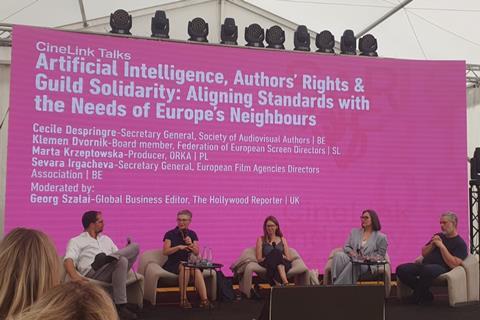
A group of experts on creators’ rights has issued a stark warning that AI content will “flood the commercial market and will suck out of a lot of money” in the next few years.
“I’m sorry to say we’re still in this fight to have AI companies recognise they are making copyright [infringing] acts,” said Cecile Despringre, secretary general at the Society of Audiovisual Authors (SAA).
Despringre was speaking on a panel titled ‘Artificial Intelligence, Authors’ Rights & Guild Solidarity: Aligning Standards with the Needs of Europe’s Neighbours’, as part of the CineLink Industry Days at Sarajevo Film Festival.
Despringre was critical of the General-Purpose AI Code of Practice, published by the European Union last month as a voluntary tool to help AI providers comply with the EU’s AI Act, which came into law on August 2.
“This code of practice is very disappointing from the rightsholders’ perspective because it’s very much in favour of the AI companies,” said Despringre. “It doesn’t create concrete obligation to respect copyright, it’s very limited in terms of transparency, which should be the basis of any discussion.”
Despringre’s organisation has 33 members in 25 countries including those outside the EU and countries from southeast Europe; and is developing activities in North Macedonia, Kosovo and Albania. The SAA will hold a seminar on authors’ rights in Skopje, North Macedonia in November where it will discuss “our approach to the AI tsunami that is going through the whole society, but in particular the audiovisual sector.”
The executive said two years ago her organisation was working mainly on how streaming platforms engage with authors’ rights, when the AI issue took over. “We approach AI with the same spirit [as streaming platforms],” said Despringre. “AI companies are using audiovisual works, copyright-protected works, to train their AI models.
“We consider that a new use of these works and that copyright principles should apply.”
The SAA has narrowed what it calls the “art of AI” down to three areas where creators must be protected: “authorisation, remuneration, transparency.”
“For us as film funds, the big question is what types of productions will we support?” said Sevara Irgacheva, secretary general at the European Film Agencies Directors Association, which has members including the UK’s BFI, France’s CNC and the German Federal Film Board. “What will be the line between an AI-assisted work where it is used as a tool; and an AI-generated work where the simplest prompt [creates the whole work]?”
These questions will take centre stage “not in 10 years; it’s going to be in the next two to five years,” said Irgacheva.
Unity
“AI content will flood the commercial market and will suck out a lot of money,” was the prediction of Klemen Dvornik, a board member on the Federation of European Screen Directors. The only way to counter this will be “unity of us in the AV sector to come to a solution as soon as possible.”
“Protect local economies, protect your film funds, your local financiers,” said Dvornik of preventative measures against AI. “Find a way for them to implement cultural policies – implement local voices, new voices.”
Marta Krzeptowska, a producer at Polish production and post-production facility Orka in Warsaw, highlighted how AI is removing the “pain” that is an essential component of art creation. But not in a good way. “We got used to cinema and art coming with effort and time,” said Krzeptowska. “Pain is part of creation. This is part of the conversation that we should teach the younger generation. The moment of selection should belong to us, not the machine. You can select [if you have] knowledge, but knowledge always comes with effort.”
The panel also highlighted a concern US ownership of AI firms will lead to a US slant in their models. “The biggest AI developers are US-based and fed certain content and data,” said Irgacheva. “As Europeans, we need to be sure that – in an ethical respect with copyright – we make sure works created here can be used to train AI models, so we do not have even more US-inspired content.”
“For European culture to be reflected in these tools, you need the US companies to recognise they are using your works to train their models,” said Despringre. “We are still in this battle; they claim they are benefitting from an exception to copyright.” The executive said her members “have knocked on the door of OpenAI, Microsoft” and said “let’s have a conversation so we can design the best licensing models.
“We can set fair conditions; but this dialogue isn’t taking place, and unfortunately, the EU institutions are still not pushing for this conversation,” said Despringre, acknowledging that the EU is under pressure from politicians who “do not want any regulations; the political atmosphere is more towards deregulation.”
Sarajevo Film Festival closes on Friday August 22.















![[L-R]: Amanda Villavieja, Laia Casanovas, Yasmina Praderas](https://d1nslcd7m2225b.cloudfront.net/Pictures/274x183/6/4/1/1471641_pxl_20251224_103354743_618426_crop.jpg)









No comments yet